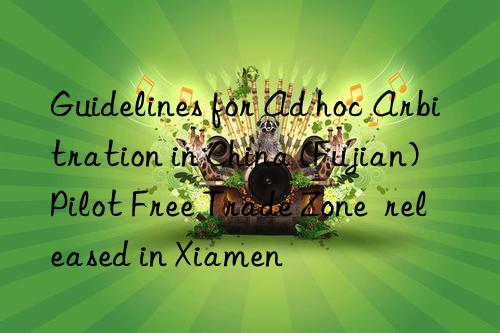
The "Guidelines for Interim Arbitration in the China (Fujian) Pilot Free Trade Zone" ("Guidelines") was jointly released by four institutions in Xiamen on the 31st.
Li Hu, deputy director of the China Maritime Arbitration Commission (hereinafter referred to as "CMAC"), Lu Hailin, deputy director of the Xiamen Free Trade Commission, Ke Biru, chairman of the Xiamen Council for the Promotion of International Trade, and Wang Guiying, chairman of the Xiamen Lawyers Association, issued the above-mentioned "Guidelines" on behalf of their respective institutions.
Li Hu said that the "Guide" aims to systematically sort out the legal basis, procedural rules and precautions for Chinese and foreign enterprises to resolve disputes through ad hoc arbitration in the China (Fujian) Pilot Free Trade Zone, and provide guidance for enterprises and other market players in the Pilot Free Trade Zone. By choosing ad hoc arbitration to resolve disputes, provide rules and operational guidelines, promote the development of ad hoc arbitration practices that are in line with China's national conditions, advanced in concept, in line with international standards, and flexible in norms, and strive to create a "Fujian (Xiamen) model" of foreign-related maritime and commercial dispute resolution with exemplary effects. Provide reference for the practice of ad hoc arbitration in China Pilot Free Trade Zone and Free Trade Port, and promote the development of ad hoc arbitration in China; at the same time, it fills the gap in the practice guidelines for ad hoc arbitration in China Pilot Free Trade Zone and Free Trade Port, and meets the parties’ needs for diversified arbitration services According to actual needs, further optimize the market-oriented, rule-of-law, and internationalized business environment in free trade pilot zones and free trade ports, and promote the high-quality development of China's pilot free trade zones and free trade ports.
Lu Hailin believes that the joint release of the "Guidelines" is the result of CMAC's active support and participation in the creation of the "Maritime Silk Road International Legal and Business Integration Service Base" by relying on the "first trial" policy advantage of the Pilot Free Trade Zone The important measures are aimed at exploring and carrying out practical application of ad hoc arbitration in line with China's national conditions, with advanced concepts, international standards, and flexible norms, which will further promote Xiamen's creation of "a highland of first-class rule of law services based in Fujian, radiating across the Taiwan Strait, affecting the whole country, and facing the world."
He said that in the next step, the Management Committee of Xiamen Free Trade Area will deepen cooperation with CMAC, actively support the implementation and application of ad hoc arbitration rules in the Pilot Free Trade Zone, and in order to create a higher-level Maritime Silk Road Central Legal Area, Serve Xiamen to create a node city with a new development pattern and make due contributions.
Ke Biru said that the joint release of the "Guidelines" is an innovative measure in the field of commercial law in the Xiamen Pilot Free Trade Zone, and it is also the latest achievement of the China Council for the Promotion of International Trade in supporting the construction of the Fujian Maritime Silk Road Central Legal District. In the next step, CCPIT Xiamen will rely on Xiamen's advantages in bringing together CCPIT law-related institutions to accelerate the creation of a diversified, one-stop, full-chain foreign-related commercial legal comprehensive service platform, and form a CCPIT legal service brand with Xiamen characteristics.
Wang Guiying said that the "Guidelines" is a normative guideline that combines the practical experience of multiple parties with complete elements and content, and provides clear operational guidance for commercial entities on how to use ad hoc arbitration to resolve disputes in the Fujian Free Trade Zone.
According to industry insiders, the "Guide" is a practical guideline on how to carry out ad hoc arbitration. It clarifies the prerequisites for ad hoc arbitration in the free trade zone, highlights the difference between ad hoc arbitration and institutional arbitration, and emphasizes that arbitration institutions Providing management services when necessary plays an important leading role in further promoting the development of ad hoc arbitration in China.



 微信扫一扫打赏
微信扫一扫打赏
